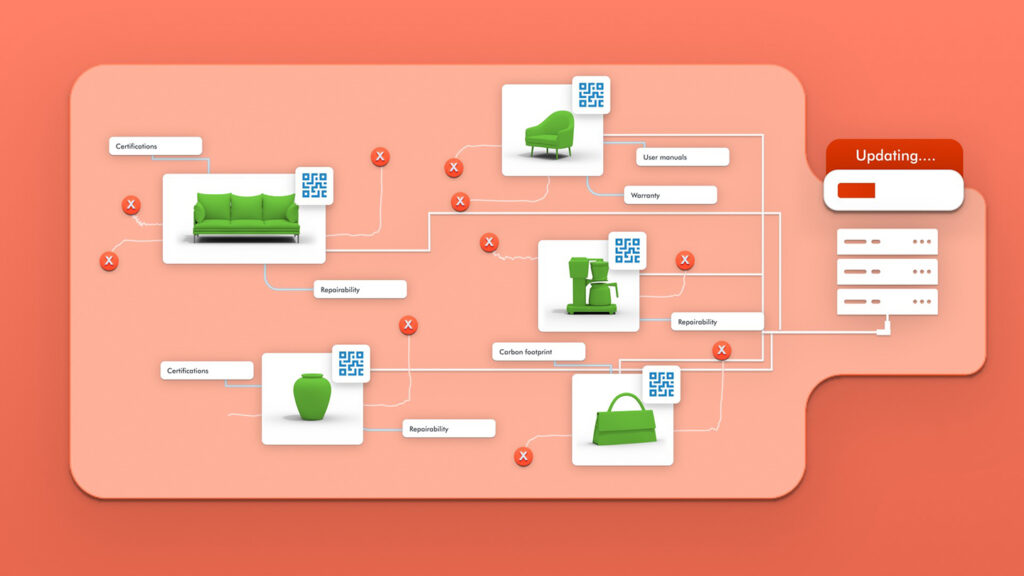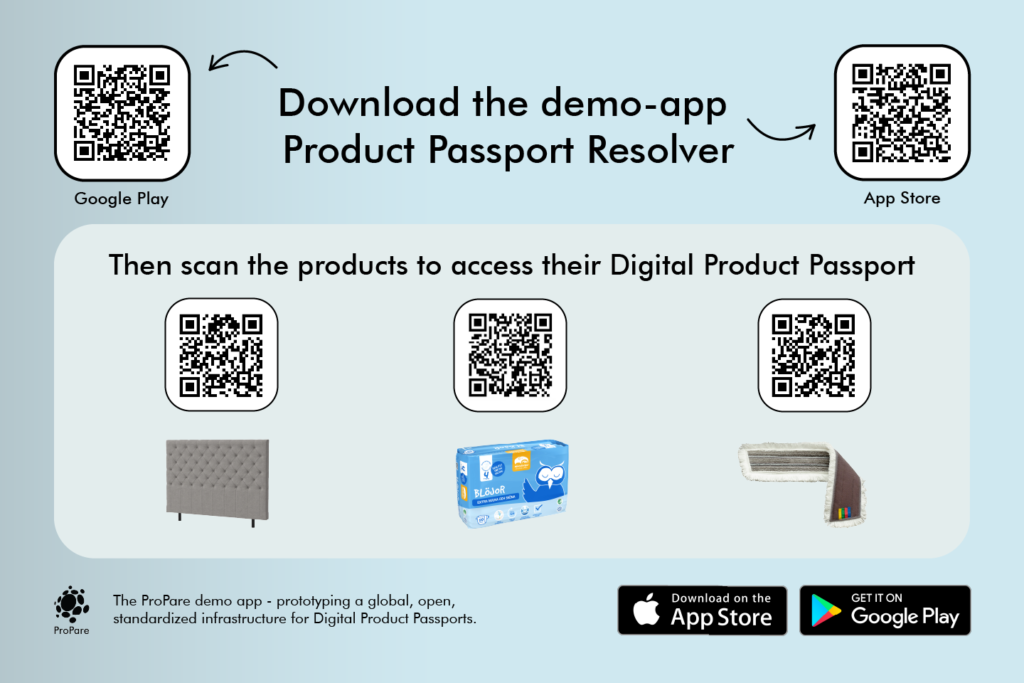Technical Service Providers – get a head start on Digital Product Passports
The upcoming EU legislation will require most products on the EU market to have a Digital Product Passport (DPP). This will provide data on product specifics and sustainability performance in real-time, throughout the product’s life cycle. DPPs are crucial for a sustainable transition and have the potential to spark increased circularity and transparency. They also provide new business opportunities for technical service providers, aiming to support customers on their sustainable journey. However, to ensure successful implementation, the practical solutions must be built on global, open, and competition-neutral standards, avoiding non-compatible solutions. The ProPare prototype for such infrastructure shows how it could work in practice.

Sustainable Business Opportunities
Digital Product Passports are good for business and will benefit companies that want to be at the forefront. Through a standardized global solution, companies can contribute to more sustainable production and consumption with increased circularity, transparency, and traceability. Thereby, we together take important steps towards fulfilment of Agenda 2030. DPPs also mean new business opportunities for technical service providers. There will be great opportunities to offer services that enable large and small companies to create and share their DPPs with customers as well as other actors.

Challenges & Risks
With the right implementation, Digital Product Passports will benefit the planet, and businesses. However, some risks need to be managed for a successful result. For example, using different data-sharing standards can hamper interoperability, with transparency and traceability being lost. In addition, solutions built on centralized databases would be highly resource-demanding and there is a substantial risk of poor data quality. Managing data in a decentralized manner, where data is handled close to the information owner, provides better conditions for updated data and promotes competition on equal terms.
The ProPare Solution
The ProPare prototype shows how a global, standardized infrastructure for Digital Product Passports could work in practice, using a set of global, open, and competition-neutral standards. With a common language used to identify every single unique product on the market, and a resolver pointing to the right data sources, all actors can access relevant, reliable information in real time, from multiple, decentralized sources. ProPare has proven that it works for third-party certifications, however, it can be used to link all types of data to a product, no matter the industry, company, or product category.
7 Reasons to Test ProPare
- Open, Global, Competition-Neutral Infrastructure: The ProPare prototype addresses relevant risks regarding infrastructure and data storage and accommodates all technical requirements to create interoperability between systems. By using decentralized data sharing, there will be good opportunities for both small and large companies to create useful Digital Product Passports.
- Fulfills the EU’s Basic Conditions: The ProPare prototype is a long-term and stable choice to use as an underlying infrastructure for DPPs. ProPare accommodates all the basic conditions in the EU’s Ecodesign for Sustainable Products Regulation (ESPR).
- Generic Solution: ProPare’s prototype is a generic solution that enables companies regardless of industry, company, or product to respond to the requirements for a product passport vis-à-vis authorities and consumers. The solution can be used regardless of the actor in the chain – as a company, government actor, or consumer.
- Data in Real-Time: ProPare’s prototype shows how you can set up an infrastructure enabling brand owners and other actors to provide customers and other stakeholders with reliable data in real-time throughout the product’s life cycle.
- Control Over Data: The solution allows brand owners to retain control over what data is presented in the DPP, even if the information is stored locally by the information owner.
- Reliable Data on Third-party Certifications: Brand owners and other actors can provide verified information in real-time on third-party certifications, as this type of data is stored and provided by the certification body, not by the supplier or brand owner.
- Easier Handling of Sustainability Data: By using existing technology in a new way, the prototype avoids cost-driving large databases where copies of data are stored.
Global Standards Used
- Global Trade Item Number (GTIN): A GS1 number used to give products and packaging a globally unique identity. The number identifies products worldwide. Basically, all commercial products have a GTIN which ensures that trade items are not mixed up with each other.
- GS1 Digital Link uri syntax standard: A standard that enables the consistent representation of GS1 identification keys within web addresses as well as within barcodes containing web addresses to link to online information and services.
- GS1 Digital Link – link types and resolver standard: A GS1 conformant resolver is a web server that can process GS1 Digital Link URIs, redirecting or directly answering requests by this standard.
- GS1 Web Vocabulary: Collects terms defined in various GS1 standards and data systems and is made available for general use following Linked Data principles. The GS1 Web Vocabulary includes the link types used in GS1 Digital Link to annotate links to related resources, such as product information pages, instruction manuals, related videos, certification information, brand owner APIs, traceability information, and more.
- JSON-LD: Linked Data is a way to create a network of standards-based machine interpretable data across different documents and websites. It allows an application to start at one piece of Linked Data and follow embedded links to other pieces of Linked Data that are hosted on different sites across the Web.
The ProPare solution guide for Digital Product Passports guides the parties involved in the ProPare project. The guide aims to give a better understanding of the proposed set-up of the ProPare prototype with GS1 Sweden Resolver, App, and Data sources respectively, to achieve the project goal.

Take Action
- Start Developing Products Now: Get inspired by ProPare’s infrastructure and build your prototype for Digital Product Passports. Feel free to use ProPare’s experiences during your learning journey toward creating a DPP solution that suits your customers’ needs. Download ProPare’s Technical Guidelines here!
- Make Use of Global Standards: No matter what your customer offering looks like – base your company’s solution on an open, global, standardized infrastructure to ensure interoperability between systems. Creating solutions that are not compatible with other systems will be costly and defeat the purpose of DPPs.
- Offer Your Solutions: Take the chance to support brand owners in their journey towards DPP by guiding and communicating the benefits, and providing compatible solutions based on decentralized data storage.
- Build flexible solutions: Prepare to be able to easily make adaptations for different businesses and industries based on the company’s needs.
Technical Guide
The ProPare Technical Solution Guide for Digital Product Passports aims to give a better understanding of the proposed set-up of the ProPare prototype with the GS1 Sweden Resolver, the Demo-app and Data sources respectively, to achieve the ProPare project goal. Learn more in the guide.
The ProPare Project
The ProPare project was carried out in broad collaboration between non-profit actors Axfoundation, Ecolabelling Sweden AB, GS1 Sweden and the Swedish Trade Federation, as well as trading companies Ahlsell, Dagab, Mio and technology developer Blue Cromos. Read more about the ProPare project.
FAQ
What is a Digital Product Passport? Will the law apply to all products? What does a “global and competition-neutral standard’ mean? How does a resolver work? The FAQ provides quick answers to some of the most frequently asked questions about product passports. Read more in the Q & A here.


